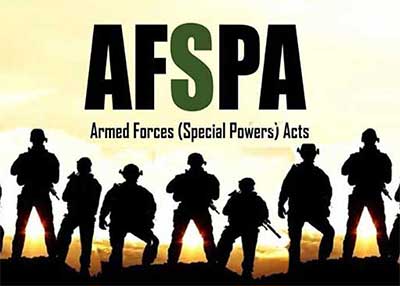GS-2: Functions and responsibilities of the Union and the States; issues and challenges pertaining to the federal structure;
GS-3: Linkages between development and spread of extremism; Security challenges and their management in border area
Key Phrases: AFSPA, disturbed areas, armed forces immunity, Insurgency, unbridled power, draconian act.
Why in News?
The recent killings of civilians by security forces in a case of alleged mistaken identity in Nagaland has once again rekindled the debate over the Armed Forces Special Powers Act (AFSPA).
Keypoints:
Addressing reporters after attending the funeral services of the civilians, Chief Minister Neiphiu Rio said that he has urged the Centre to remove AFSPA from Nagaland.
What is AFSPA?
AFSPA gives armed forces special powers to control ‘disturbed areas’, which are designated by the government when it is of the opinion that a region is in such a disturbed or dangerous condition that the use of armed forces in aid of civil power is necessary.
- Under its provisions, the armed forces have been empowered to
- Open fire,
- Enter and search without warrant, and
- Arrest any person who has committed a cognisable offence, all while having immunity from being prosecuted.
- The power to declare a territory “disturbed” initially lay with the states, but passed to the Centre in 1972.
- Section 3 of AFSPA says that an area can be declared disturbed if it is the “opinion of the Governor of the state or the central government” which “makes the use of armed forces in aid of the civil power necessary”.
- While the Act gives powers to security forces to open fire, this cannot be done without prior warning given to the suspect.
- The Act further says that after any suspects apprehended by security forces should be handed over to the local police station within 24 hours.
- It says armed forces must act in cooperation with the district administration and not as an independent body.
When was AFSPA enacted?
- The law is based on the Armed Forces (Special Powers) Ordinance of 1942, which was issued during the Quit India movement.
- Enacted by Parliament on September 11, 1958, AFSPA was first implemented in the Northeast, and then in Punjab.
- On August 18, 1958, the Bill on measures to battle the Naga insurgency
in the then state of Assam was introduced in Lok Sabha, and debated for two
hours.
- Then Home Minister Govind Ballabh Pant called the proposed law “a very simple measure” to control the “misguided Nagas indulging in mischievous activities”.The law was needed, he argued, as it was not feasible, “over such a vast area to depute civil magistrates to accompany the armed forces wherever there may be trouble, because (it) happens unexpectedly”.
Where is AFSPA in effect now?
Currently, AFSPA is in effect in Jammu and Kashmir, Nagaland, Assam, Manipur (excluding seven assembly constituencies of Imphal) and parts of Arunachal Pradesh.
- The law has been repealed where insurgencies have subsided, and when governments have gained confidence of managing the region using the police force.
- Thus, AFSPA was repealed in Tripura in 2015, and in 2018 the Centre also removed Meghalaya from the list, while also restricting its use in Arunachal Pradesh.
- AFSPA was withdrawn from the Imphal Municipal Area in 2004 after several civil society campaigns -the hunger strike by Irom Sharmila (the Iron Lady of Manipur) being the most high-profile of them -and public mobilisations in Manipur.
Issues with the Act:
- AFSPA has often been criticised as a “draconian Act” for the unbridled power it gives to the armed forces and the impunity that security personnel enjoy for their actions taken under the law.
- Under AFSPA, the “armed forces” may shoot to kill or destroy a building on mere suspicion.
- A non-commissioned officer or anyone of equivalent rank and above may
use force based on opinion and suspicion, to arrest without warrant,
or to kill.
- He can fire at anyone carrying anything that may be used as a weapon, with only “such due warning as he may consider necessary”.
- Once AFSPA is implemented, “no prosecution… shall be instituted except with the previous sanction of the central government, in respect of anything done or purported to be done” under this Act.
Way Forward:
- The Jeevan Reddy Committee formed in 2004 had recommended a
complete repeal of the law.
- The Second Administrative Reforms Commission, headed by Veerapa Moily, endorsed these recommendations.
- In 2016, the Supreme Court ruling on a petition filed by the
Extra Judicial Execution Victims Families Association (EEVFAM), held
that
- Due process needs to be followed in civilian complaints reported from areas under the AFSPA and
- That the Act doesn’t provide blanket immunity to army personnel in anti-insurgency operations.
- The apex court also ruled that over 1,500 cases of alleged fake encounters in Manipur, over the last 20 years, “must be investigated”.
SC further observed that the continuance of the Act in any region for extended periods symbolises, “ a failure of the civil administration and the armed forces”.
Source: Indian Express
Mains:
Q. AFSPA had become a symbol of oppression and it should be repealed. Comment.









